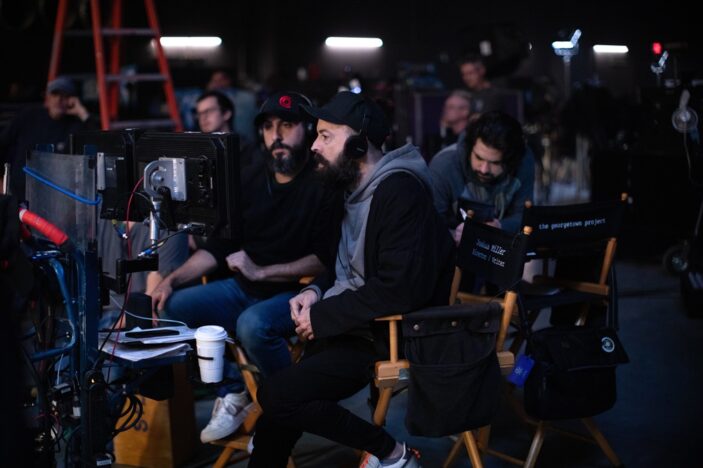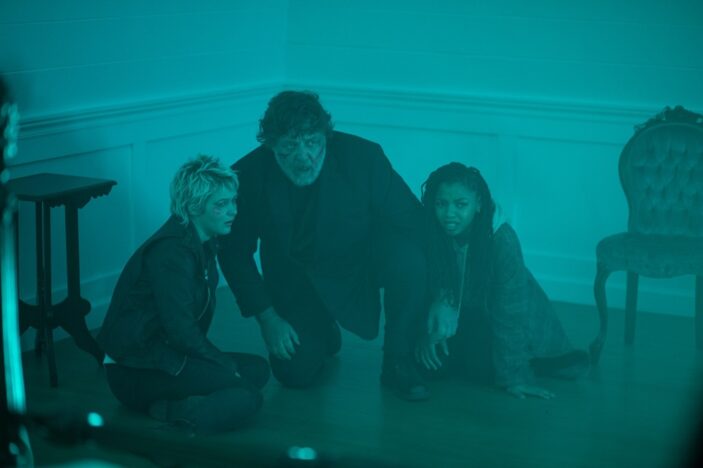
Russell Crowe stars as troubled actor Anthony Miller, who begins to unravel while working on a supernatural film. His estranged daughter wonders if he’s slipping back into his past addictions or if there’s something more sinister at play.
Such is the logline for The Exorcism, a new dramatic horror film from writer/director Joshua John Miller, who found inspiration from his own father’s casting in the classic chiller The Exorcist; his father, Jason Miller, starred as Father Karras in the original.
Ahead of the film’s theatrical release – it’s set for a June 13th date in Australia – Peter Gray spoke with Miller about his own experiences in the industry and how they formed his storytelling, the unlikely challenges he faced in keeping elements of his original vision, and how Crowe’s “cool person” status inspired more to join his film.
Before I get to The Exorcism, I just wanted to say thank you for putting The Final Girls out there in the world. It was such a beautiful ode to that type of character.
Oh, thank you. It’s nice to see the enduring love for that movie.
And writing The Final Girls and The Exorcism, you’re writing about the industry in many ways. Because of your own connection to starring in genre films and television, does it make it easy to delve into that as narrative inspiration?
Yeah, I mean, what do they tell you? Write what you know, yeah? I’d like to think the next movie I do won’t be directly based on experience, but, and I’ve said this before, I think that the movie is definitely rooted in experiences that my writing partner-slash-life partner and I have had in working in the studio system. I think making films is like a deal with the devil, and the landscape of several creative projects we’ve been involved with over the last decade felt sometimes run by demon. I think that was the inspiration for the movie.
Starting out as an actor, did you always know that writing and directing was the creative path you wanted to take?
When I was 14/15 years old, I was doing a play on Broadway, (and) during rehearsals myself and the other lead were replaced. That was a devastating experience for me, especially at such a young age. I remember being in this weird transitional place of thinking I was fired because I was “too gay” and that they had found out, or that there was no role left for me. And I didn’t want to be at the mercy of someone else’s stories, either. I wanted to write my own. I realised I was kind of in the closet in a couple of ways. I was writing a lot, but I kept those in a journal in a box in my literal closet (laughs). I had been journaling on these giant legal pads, and I thought, “Oh, there’s so much writing here, and what I am doing is interesting. I should explore this.”
That sort of became a gateway at that point. I took a class. I didn’t want to make movies or write movies, per se, I just started writing prose. And I found my way back to film through prose.
Your father’s role in The Exorcist was obviously a source of inspiration here. Has incorporating this idea always been something you’ve wanted to explore? When did the time come that you thought, “Now, is the right time.”?
Well, Kevin Williamson, who was one of my heroes growing up, because he was an out, queer person, (he) had always been someone I wanted to know. He used to live down the street from me growing up, so I used to try and crash his parties. He’d find me drunk and passed out on the couch, and I’d be the last to leave. He didn’t know who I was at first, but then he realised I was the kid from Near Dark, and now we’ve known each other for a long time.
Subsequently, after The Final Girls, which he was a big fan of, he wanted to do something that felt meta and was maybe a cousin to that film. And that’s how the idea for (The Exorcism) came about. But it was always rooted in…you know, after Trump got elected in America, it just seemed like straight white men were going crazy. We wanted to do an exorcism movie, and we thought let’s not have it be a hysterical woman saved by a man. Why can’t we make a man possessed and be saved by two lesbians?
I’m not actually a big exorcism fan, in terms of the genre. I love The Exorcist, the original, but that transcends horror, right? It’s more a drama to me. When I made this movie, I didn’t really try to make it scary. I tried to make it dramatic. I think the studios and the PR people try to sell it as a horror, but I see it as a family drama.
I thought the same thing watching this. As much as it has horror sequences throughout, it very much felt like a character drama. I appreciated that. I think we have an idea of what an exorcism movie is going to be, and it’ll play by certain beats, and this was very unexpected. And with The Exorcist, was it one of those films you saw at too young an age? Were you able to watch it through different eyes? I imagine watching your father die on screen is a weird thing to grasp.
I think I first saw it on television, so it was obviously heavily edited. I saw it a couple of times when I was a kid. It was exciting and weird and scary. The uncut version? I wonder when the first time I saw it was…
I know I saw the re-issue, and the new cut that (William) Friedkin had done that came out in the late 90s or early 2000s. I didn’t think that was as good as the original. But I got to see it on the big screen, and that was cool. It still remains one of my favourite movies. And I don’t say that in a biased way. It just happens to be, I think, a perfect film. I think it’s challenging in the way it deals with faith and the fear of the unknown. I think it’s also a weird allegory for divorce and the fallout of the family unit. It has layers.
You look at this film and you have Russell Crowe to begin with, but then Ryan Simpkins, Chloe Bailey, Sam Worthington, David Hyde Pierce…this cast is impressive. Was it a case of knowing who you wanted for certain roles? Once you get someone like Russell, do more people come on board? How was that casting process?
Yeah, once Russell came on board, and I’ve always been a huge fan of his, and I had no idea he was going to say yes. That was a surprise. I think his involvement definitely (helped). It’s like when a cool person tells you they’re going to a party, and it’s a cool person that everyone follows.

Was there anything that proved the biggest challenge when filming?
I think the whole movie was a challenge, you know. We had started this before the pandemic, and then we were shut down, and we kept trying to get back on our feet to finish it. It’s been a long haul. We certainly weren’t shooting this for five years (note – production for the film predominantly started in 2019), but we’ve had to be peaceful about it. That’s been very challenging. But I’m proud of the way it is now.
I think the hardest thing was the internal conversations of what kind of movie it was going to be, pre and post-production. I even grapple with those questions today. I was sitting here thinking, “I wanted to edit a whole different way.” The last half-hour of the movie, and all of these scenes that aren’t in the cut now, the total trajectory of the last third…it could totally change.
I was going to ask about the original idea of this film, because I believe it was called The Georgetown Project. Did it pivot into a different direction as you were writing it or as you were filming?
The more I talk to filmmakers, the more it seems that everyone reassures me that every movie starts out one way and turns into something else. But that definitely happened with this movie. I think that’s just part of the experience, right? You just have to go, “Okay, well, this is what it’s become.”
Yes, there’s interference from other people trying to force something to happen, and as a first time director you have to navigate that. That was really the most challenging part. In the end, one of the most important things that I wanted to maintain was the storyline between the girls. I had a battle over that, But I was happy to keep them in in the editing process.
Because of your experience as an actor, does it make easier to direct and deal with potential outside influences because you know how the industry works?
Let’s just say I have a lot more guile than before this process. I think that’s more rooted in optimism about film. I still feel that cinema is the path forward, and not all these streaming things, you know? I actually want to shoot on film for my next movie. I believe in cinema. I don’t believe in Hollywood. And I think there’s a distinct difference.
I was not prepared for this experience, to be honest. It was fraught for me. I think I learned a lot, and I’m more prepared than ever for the next.
The Exorcism is screening in Australian theatres from June 13th, 2024.
